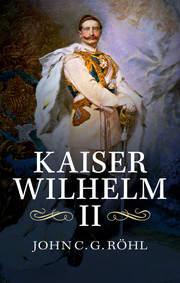Book contents
- Frontmatter
- Dedication
- Contents
- List of figures
- Acknowledgements
- Preface to the English edition
- Preface to the German edition
- Acknowledgements
- Overview: Wilhelm the Last, a German trauma
- Part I 1859–1888: The Tormented Prussian Prince
- Part II 1888–1909: The Anachronistic Autocrat
- Part III 1896–1908: The Egregious Expansionist
- Part IV 1906–1909: The Scandal-Ridden Sovereign
- 14 The Eulenburg affair (1906–1909)
- 15 Bülow’s betrayal of the Kaiser: the Daily Telegraph crisis (1908–1909)
- 16 From Bülow to Bethmann Hollweg: the Chancellor merry-go-round (1909)
- Part V 1908–1914: The Bellicose Supreme War Lord
- Part VI 1914–1918: The Champion of God’s Germanic Cause
- Part VII 1918–1941: The Vengeful Exile
- Notes
- Index
15 - Bülow’s betrayal of the Kaiser: the Daily Telegraph crisis (1908–1909)
Published online by Cambridge University Press: 05 September 2014
- Frontmatter
- Dedication
- Contents
- List of figures
- Acknowledgements
- Preface to the English edition
- Preface to the German edition
- Acknowledgements
- Overview: Wilhelm the Last, a German trauma
- Part I 1859–1888: The Tormented Prussian Prince
- Part II 1888–1909: The Anachronistic Autocrat
- Part III 1896–1908: The Egregious Expansionist
- Part IV 1906–1909: The Scandal-Ridden Sovereign
- 14 The Eulenburg affair (1906–1909)
- 15 Bülow’s betrayal of the Kaiser: the Daily Telegraph crisis (1908–1909)
- 16 From Bülow to Bethmann Hollweg: the Chancellor merry-go-round (1909)
- Part V 1908–1914: The Bellicose Supreme War Lord
- Part VI 1914–1918: The Champion of God’s Germanic Cause
- Part VII 1918–1941: The Vengeful Exile
- Notes
- Index
Summary
On 28 October 1908 there appeared in the London Daily Telegraph, with the express permission of Kaiser Wilhelm II, an interview that he had given to an unnamed English ‘diplomat’. The storm of indignation it aroused in Germany was so massive that the Kaiser was almost swept from the throne. Like the vast majority of Germans, Baroness Hildegard von Spitzemberg, Axel Varnbüler’s sister, thought the interview was ‘the most shaming, despicable, indiscreet and dangerous thing that the Kaiser has ever done! […] The Kaiser is ruining our political position and making us the laughing-stock of the world…!! It makes one despair and wonder if one is in a madhouse!’ People all over Germany felt a sense of misery and anger, she recorded, just as if a battle had been lost. ‘There is something so unmanly and childish in this talkativeness that seems positively contemptible in ordinary mortals.’ Maximilian Harden saw the newspaper interview as confirmation of his very worst fears. In a letter to Holstein he expressed the stark alternatives Germany faced, in his view: ‘To clear ourselves of shame and ridicule, we will have to go to war, soon, or face the sad necessity of making a change of imperial personnel on our own account, even if the strongest personal pressure had to be brought to bear.’ In many towns angry crowds demanded the Kaiser’s abdication; in an extraordinary debate in the Reichstag on 10 and 11 November deputies from all parties castigated Wilhelm II’s ‘personal rule’. The government bench looked on helplessly. ‘One more day like that and we shall have a republic,’ the future Reich Chancellor Theobald von Bethmann Hollweg, who was reportedly ‘in a state of collapse’, declared after the tumultuous parliamentary session.
- Type
- Chapter
- Information
- Kaiser Wilhelm IIA Concise Life, pp. 110 - 115Publisher: Cambridge University PressPrint publication year: 2014

